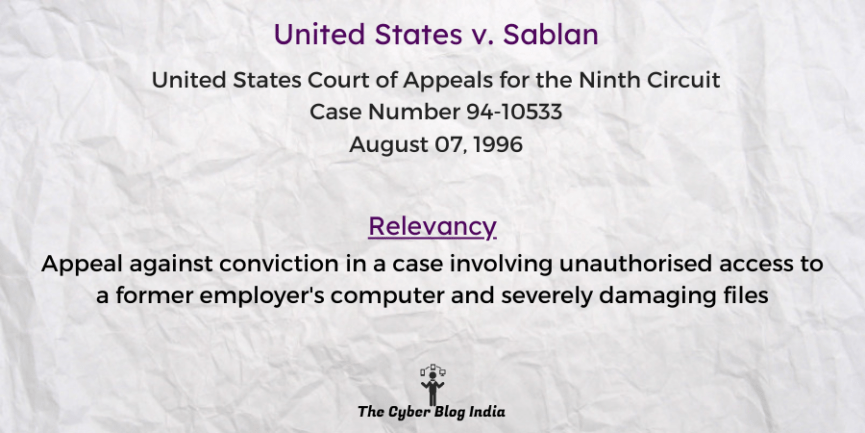United States v. Sablan

United States of America v. Bernadette H. Sablan
92 F.3d 865
In the United States Court of Appeals for the Ninth Circuit
Case Number 94-10533
Before Chief Judge Hug, Circuit Judge Thompson, and Circuit Judge O’Scannlain
Decided on August 07, 1996
Relevancy of the Case: Appeal against conviction in a case involving unauthorised access to a former employer’s computer and severely damaging files
Statutes and Provisions Involved
- The Computer Fraud and Abuse Act, 18 U.S.C. § 1030
Relevant Facts of the Case
- Sablan is a former employee of the Bank of Hawaii’s Agana branch in Guam. The bank had fired her for circumventing security procedures in retrieving files.
- On August 15, 1992, she left a bar in the early hours and entered the bank through an unlocked loading dock door.
- Thereafter, she went to her former work site using a key she had kept. She used her old password to log into the bank’s mainframe.
- Her conduct severely damaged several bank files. According to her version, she called up several computer files and logged off. The Government’s version states that she changed several files and deleted others.
- The District Court calculated her sentence per Section 2F1.1(a) of the Sentencing Guidelines. The court enhanced her sentence due to the damage her actions caused.
Prominent Arguments by the Counsels
- The defendant’s counsel argued that the District Court improperly calculated the amount of damage due to her actions. This had led to an improperly calculated sentence, an improper restitution order, and a refusal to depart downward.
- Further, the defendant’s counsel contended that CFAA must have a mens rea requirement for all the elements of the crime. Based on this argument, her indictment was defective as it did not allege the appropriate mens rea. The statute would become unconstitutional if the CFAA does not have a mens rea requirement.
Opinion of the Bench
- CFAA is ambiguous as to its mens rea requirement. However, the Supreme Court has never ruled that mens rea is a constitutional requirement.
- The District Court’s approach to calculating the damages caused is reasonable and fair.
Final Decision
- The court affirmed her conviction and sentence under CFAA and remanded the case back to the District Court for recalculation of restitution consistent with the court’s opinion.
